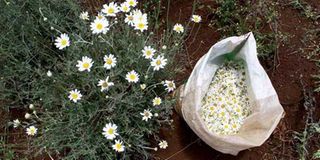Cartels have destroyed pyrethrum sector - Kipipiri MP

Pyrethrum flowers. Kipipiri MP Samuel Gichigi has blamed the woes facing pyrethrum growing on a powerful and corrupt cartel. PHOTO | SULEIMAN MBATIAH | NATION MEDIA GROUP
What you need to know:
- Mr Gichigi said a majority of the people in his Kipipiri constituency depended on the crop for their daily upkeep, but were now wallowing in poverty.
- He now wants President Uhuru Kenyatta and his Deputy William Ruto to set up a task force to review pyrethrum production with a view to reviving it.
- Kenya was once one of the world’s largest producers of pyrethrum, with 17,500 metric tonnes of dried pyrethrum flowers being supplied every year.
- Mr Gichigi called on the government to give pyrethrum growing the same treatment that it was according to the coffee and tea farmers.
Kipipiri Member of Parliament Samuel Gichigi has blamed the woes facing pyrethrum production on a powerful and corrupt cartel.
Speaking to Nation.co.ke, the legislator said the cartels had pocked farmers' money, crippling the once thriving sub-sector.
Mr Gichigi said the crop was an economic mainstay for farmers from more than 12 counties including Nakuru and Nyandarua.
He now wants President Uhuru Kenyatta and his Deputy William Ruto to set up a task force to review pyrethrum production with a view to reviving it.
“Pyrethrum farmers are now a disillusioned lot and have resorted to uprooting the crop in favour of other [crops],” said Mr Gichigi.
He pleaded with the government to set out a revival plan to assist farmers and help weed out the cartels.
According to available statistics, the number of farmers who grow pyrethrum has sharply dropped from about 300,000 in the 1980s to around 5,000 currently.
“A visit to some of these areas that grew the crop in the counties paints a grim picture of the pyrethrum sector,” said Mr Gichigi.
WALLOWING IN POVERTY
He said a majority of the people in his Kipipiri constituency depended on the crop for their daily upkeep, but were now wallowing in poverty.
In the early 1980s, Kenya was touted to be one of the world’s largest producers of pyrethrum, with 17,500 metric tonnes of dried pyrethrum flowers being supplied every year.
But the production has now gone down to less than 700 metric tonnes after famers abandoned growing the crop due to non-payment.
Mr Gichigi called on the government to give pyrethrum growing the same treatment that it was according to the coffee and tea farmers and set up a task force aimed at reviving the crop.
“We also need to inspire pyrethrum growers by giving them incentives and weed out the cartels that are running down the sector,” he said.
The Kipipiri lawmaker said the few remaining pyrethrum farmers had been left at the mercy of middlemen who are buying the product at Sh100 per kilogramme.
Areas where the crop was grown include Bahati, Subukia, Eburru, Timboroa, Keringet, Naivasha (all in Nakuru) and Oljororok and Mawingu in Nyandarua.





